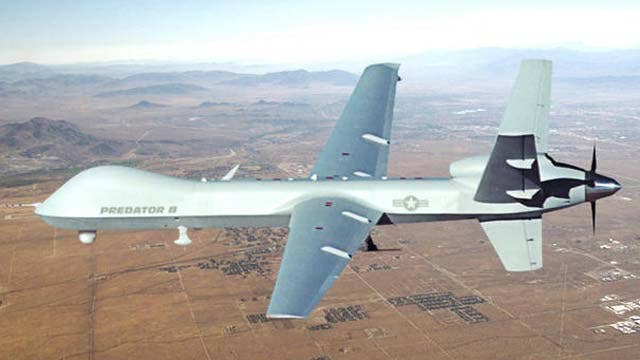Is U.S. drone policy threatening constitutional rights?
Lt. Col. Tony Shaffer addresses drone policy concerns, including making sure our rights are upheld
It sounds like an Orwellian idea from a futuristic sci-fi movie. Government officials gather in a secret courtroom, poring over documents and weighing whether to approve the fly-by killing of a suspected terrorist.
If the judges say yes, the target dies. If not, the target lives.
But U.S. senators are now floating the idea of an assassination court as a way to rein in the ever-expanding drone program -- a secretive operation that, as it is, sounds like thriller fiction, but isn't.
The idea was bandied about during Thursday's confirmation hearing for CIA director nominee John Brennan, who fueled the talk by saying he thinks the concept is "worthy of discussion." The nominee, as a vocal supporter of the targeted-killing program, has come under scrutiny for what some lawmakers see as the administration's unchecked power to kill, even if the target is an American citizen.
Sen. Dianne Feinstein, D-Calif., chairwoman of the Senate Intelligence Committee, said as part of an effort to regulate the killing, she wants to review proposals to create something similar to the Foreign Intelligence Surveillance Court -- which reviews requests for wiretaps against suspected foreign agents -- for drone strikes.
Sen. Angus King, I-Maine, is pushing the idea the hardest.
According to his vision, the drone court would be an avenue for U.S. officials to argue in secret before a judge why an American citizen should be targeted for death. He said it would be like "going to a court for a warrant" and proving probable cause.
Except in this case, the judge would be ruling not on a search warrant or a wiretap -- but a missile strike from thousands of feet in the air, and thousands of miles away.
"If you're planning a strike over a matter of days, weeks or months, there is an opportunity to at least go to some outside-of-the-Executive Branch body like the FISA court in a confidential and top-secret way -- make the case that this American citizen is an enemy combatant," he said.
After questioning Brennan about the drone court idea Thursday, he followed up with a letter Friday to Feinstein and the committee's top Republican, Sen. Saxby Chambliss, R-Ga.
He noted that the FISA court has 11 federal judges to review electronic surveillance applications, and said "such a model may be useful as we consider the debate over targeted strikes."
He said an "outside judicial process" could help provide an "independent perspective" in the case of Americans who become leaders with Al Qaeda.
Under the Obama administration, the American cleric Anwar al-Awlaki, considered a top Al Qaeda operative, became the first American successfully targeted for death under the drone program. Two weeks later, his 16-year-old son was also killed in a drone strike, in which the teen was described as collateral damage.
For critics of the drone program, though, the creation of a special court may not ease their concerns.
Jonathan Turley, a well-known legal scholar and professor at George Washington University, told FoxNews.com that congressional action is "clearly warranted."
"President Obama has become the president that Richard Nixon always wanted to be. In the face of an imperial president, it is Congress' duty under the Constitution to do whatever it can to check such an abuse of power," he said in an email.
However, Turley expressed concern that a new court would "legitimate the claim of inherent authority by the president to kill citizens without charge or judicial review."
"A formal process, even if accepted by the White House, could be viewed as a concession that such power exists," he said. "It would be a lethal version of FISA where constitutional provisions are set aside in favor of a largely meaningless process of review."
Brennan on Thursday expressed a willingness to consider an assassination bureau, while stressing that such a court would be different from anything else in existence -- since the drone strikes, according to him, are only green-lighted to prevent an attack, and not to exact retribution for a prior attack.
"Our judicial tradition is that a court of law is used to determine one's guilt or innocence for past actions, which is very different from the decisions that are made on the battlefield, as well as actions that are taken against terrorists," he said. "Because none of those actions are to determine past guilt for those actions that they took. The decisions that are made are to take action so that we prevent a future action, so we protect American lives."
He said that is an "inherently Executive Branch function to determine," and that the actions are taken only when "we believe that the intelligence base is so strong and the nature of the threat is so grave and serious, as well as imminent, that we have no recourse except to take this action that may involve a lethal strike."
King said his concern is that too much power is vested in the Executive Branch when it comes to targeted killings.
"I understand you can't have co-commanders in chief, but having the executive being the ... prosecutor, the judge, the jury and the executioner all in one is very contrary to the traditions and the laws of this country," he said.
FoxNews.com's Barnini Chakraborty contributed to this report.





